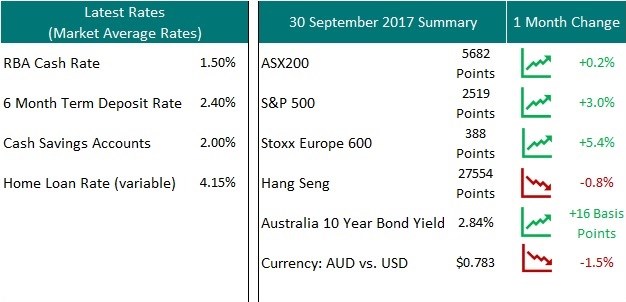

- Global shares made solid monthly gains of 2.2% in September in local currency terms.
- US shares achieved record highs given solid economic activity data and President Trump’s bold tax promises. Trump announced a ‘tax plan’ in late September which includes a large corporate tax cut from 35% to 20% as well as significant income tax cuts. This was positively received by Wall Street. Solid US economic results featuring encouraging business surveys and job gains also helped US shares. The Federal Reserve (Fed) announced a plan to reduce their holdings of US government bonds and mortgage securities which were previously used as part of the US’s stimulus measures. However the Fed emphasised that this balance sheet reduction as well as further interest rate rises should be ‘gradual’.
- European shares made sharp gains of 4.3% in September. European economic data has been positive with robust business surveys and solid jobs growth. The German election result on 24 September suggests that Angela Merkel should continue as leader for a fourth term, thereby providing some comfort to investors concerned about political stability.
- Asian shares also made solid gains. Solid Chinese business surveys and stable economic data proved supportive of Chinese shares. Japanese shares made strong gains given positive business surveys despite concerns over North Korea’s missile testing.
- Australian shares disappointed in September with a flat return for the S&P/ASX 200 Accumulation Index. There were large falls in the Telecommunications (-4.6%) sector given competitive pressures with Telstra cutting their dividend. Utilities (-3.7%) also fell given concerns over government regulatory scrutiny as well as their sensitivity to higher bond yields. However there were some positive performances from the Health Care (2.2%) and Energy (1.2%) sectors, which helped stabilise the monthly return for Australian shares.
- Australia’s economy recorded improving data in September. Economic growth rebounded in the June quarter after a soft start to 2017. Jobs growth also picked up speed with the unemployment rate stabilising at 5.6%. However, retail trade was flat in July.
- Australian government bond yields increased in September with financial markets anticipating that the Reserve Bank of Australia may be raising interest rates next year.
- The Australian dollar (AUD) fell slightly in September. The sharp decline in the iron ore price from US$79 to US$62 per tonne was a key negative contributor to the AUD.
Compiled with BT Applied Research Monthly Commentary – September 2017 and NAB Economic and Market Monthly update.
Altitude Financial Planning is a Corporate Authorised Representative of Altitude Financial Advisers Pty Ltd
ABN 95 617 419 959
AFSL 496178
The information contained on this website is general in nature and does not take into account your personal circumstances, financial needs or objectives. Before acting on any information, you should consider the appropriateness of it and the relevant product having regard to your objectives, financial situation and needs. In particular, you should seek the appropriate financial advice and read the relevant Product Disclosure Document.

